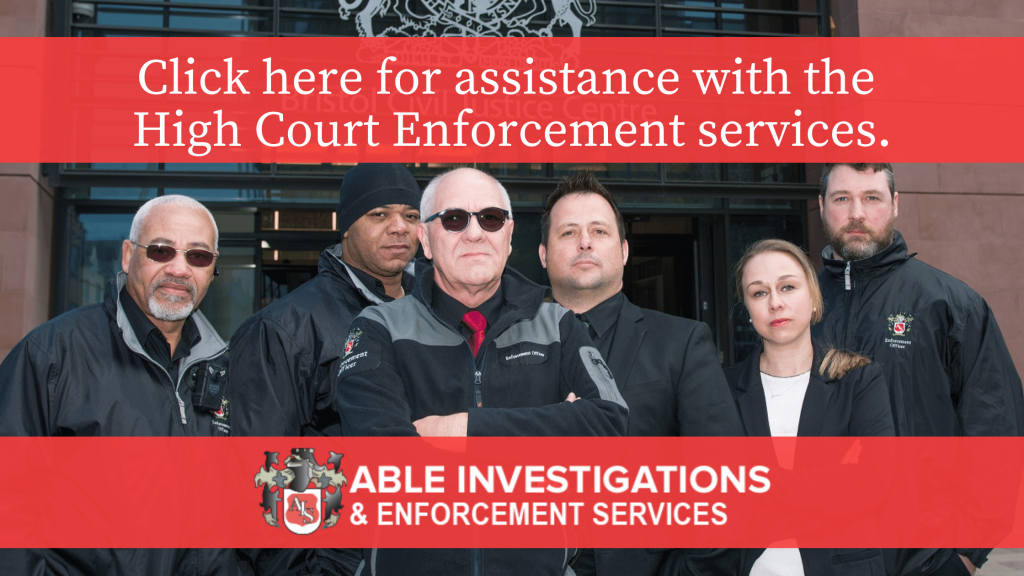Enforcement officers work for local authorities, civil enforcement agencies and county courts. They have a key role to play in collecting outstanding debts, however they are not debt collectors. Sometimes, this will be by removing possessions from the debtor’s address or by repossessing the property. Enforcement officers also conduct evictions when necessary. The property and goods which are seized by enforcement officers from debtors are recovered in order to pay court orders and fines or rent arrears which remain unpaid. With an in-depth knowledge of the Civil law, enforcement agents are fully certificated and can act rapidly for their clients within the scope of the legal framework.
Enforcement officers can be utilised to perform a range of legal actions pertaining to the recovery of debts and land for their clients.
Do you need the services of a High Court Enforcement Officer?
Contact us todayTraveller Evictions
When land is occupied illegally by trespassers, it can be quickly recovered in line with the law by a Certificated Enforcement Officer. Thanks to their in-depth understanding of Common Law, enforcement officers are fully trained in removing trespassers and can do so quickly and without compromising the reputation of the client. When acting under Common Law, there is no need for any private landowner to go through the courts, allowing evictions to be carried out as quickly as possible and with minimal fuss, normally the same day.
If your land is occupied by travellers, call us and talk to one of our experts today.
Tenant Evictions
It may be necessary for a landlord to need to forcibly evict a tenant who has ignored any notice of the landlord’s intent to terminate a tenancy. In these circumstances, hiring an enforcement officer can make the long and drawn-out process finally come to an end much more swiftly. With a residential tenancy one always has to apply for a Court Order, getting the permission of the court for the evictions.
How to Evict a Tenant
If you want to evict a sitting tenant, there are several steps you need to take before it can be passed on to an enforcement agent.
-
Give your notice.
The first step is to, in writing, terminate the tenancy. This can only be done with effect after the 6-month shorthold tenancy has been exhausted. If your tenant is still within the 6-month shorthold lease agreement, you must give notice two months prior to the end of the fixed term that you don’t wish to continue. If they are passed this initial fixed term, the notice is one month.
-
Serve a Section 21 or Section 8
This is an official notice of eviction for tenants that gives between 2 weeks and 2 months’ notice to vacate the property, depending on which form you use. To find out which one is right for your circumstances, you can read more about Section 21 and Section 8 notices.
-
Get a Possession Order
If tenants have not yet vacated the property, you can apply to the court for a possession order. If this possession order is granted, you can then apply to the High Court if your tenants still haven’t vacated by the date given on the order.
Getting a Writ of Possession from the high court enables High Court Enforcement officers to reclaim the property and evict the tenants ‘on the spot’. It is often quicker than continuing the process through the County Courts as the High Court Enforcement agents have more power of entry under a Writ of Possession and will often act much more quickly.
How a Tenant is Evicted
If an enforcement agent is required to visit the property to evict a tenant, with a Court order, the Officer can use force to enter the property, this would normally mean that a locksmith will be called to assist in entry to the property. After they have gained entry, the property is under their control and the tenants will be asked to collect any essential belongings and leave immediately. For more information about residential tenant evictions, read our article on How long does it take to evict a tenant in the UK.
Do you require reliable and legal tenant eviction services? Get in touch today.
Recovering Debts
When a County Court Judgement has been passed to recover debts, if the value of the debt is over £600 it is possible to transfer up to the High Court in order to obtain a Writ of Control, a Writ of Delivery or a Writ of Possession. A certificated High Court Enforcement Officer is then able to attend the debtor’s property in order to seize control of goods to sell at auction to cover the debt, to recover a specified item or to recover property or land under the terms of the Writ. Enforcement officers can also help to locate debtors and find their address in order to collect on outstanding monies.
What Items can be Recovered?
An enforcement officer will do an audit of all the items within the property upon gaining entry, estimating their value and noting down exactly what is there. Any items believed to be over the amount of the outstanding debt, plus auction and transport fees can be taken from the property unless it can be proven that they do not belong to the debtor. There are certain Items that Enforcement Officers are not allowed to take which Is written Into statute.
Vehicles that are on the property can also be seized by enforcement officers without any required input from the debtor.
How are Items Recovered?
Whether it’s a private individual or business debtor, enforcement officers can gain entry into a property through any unlocked or open door, regardless of whether or not they are invited; however no force must be used against a person if that person objects to the officer entering the property. With the utmost respect for the law, the debtors and the client’s reputation, enforcement officers can call for tow trucks and collection vehicles to transport any seized items.
After entry, an inspection of the goods in the property is done, and cursory estimates may be obtained for certain items. After this, officers remove any items they believe will cover the debt and associated costs.
Is your debtor taking you for a ride? Speak to us to recover your debts.
Serving Legal Papers
When a client requires legal papers to be served, they can employ the services of an enforcement officer to carry out the task on their behalf. By complying with the law, enforcement officers can act as process servers to serve all types of court order and legal documentation including divorce petitions, winding-up petitions along with tenant and landlord lease break notices.
How to Instruct an Enforcement Officer
If you have debts to recover, land or property to seize, legal documents to serve, or squatters to be removed from land or a building, you can easily and conveniently instruct an accredited enforcement officer to help you.
In the event that you’re looking to recover a debt that has been passed from the County Court to the High Court, or if you have a current CCJ that you’d like to take to the High Court, or you want to evict a tenant, all you need to do is choose the best enforcement agency for you and give them a call.
At Able Enforcements, we make it easy to recover your debts without you having to lift a finger. We are happy to help with any and all aspects of recovery and seizure we are always on hand to offer much-needed advice on next steps.
Finding a Debtor
If a Writ of Possession or County Court Judgement is obtained, an enforcement officer can do everything in their power, within the remit of the law, to track down the debtor to be able to enforce any action, or you need to locate a debtor before issuing proceedings, then we are the firm you are looking for.
The first port of call is the electoral register. Enforcement officers visit the address that a debtor is registered at, if they no longer live there, can use their resources to track them down through friends, family, contact information and other avenues to ensure that as much of a debt is recovered as possible.
Is your debtor vanished into the blue? Our investigations service is second to none in the location of missing persons, call us today.
Why you Need an Enforcement Officer
Using the services of a reputable and Certificated Enforcement Officer can make debt recovery, tenant eviction, traveller eviction and the serving of legal notices much easier. Enforcement Officers have the legal right to seize property, change locks and evict tenants when following a Court Order, meaning that they can easily and quickly resolve the situation without you needing to be directly involved.
Enforcement officers work for clients who are looking for the most painless way to achieve their desired outcome and offer an impartial, expert and Certificated service that acts on the behalf of the client while still respecting the rights of the debtor or tenant.
Choosing Able Investigations
Able Investigations are an ISO-9001 accredited team of Certificated Enforcement Officers who can carry out a full range of duties. From serving legal papers to evicting squatters and enforcing court judgements, especially dealing with travellers/squatters under Common Law. we offer a timely service within the framework of the law. If you have any queries or require any advice on any aspect of our service, our highly experienced support team are on hand to assist.
Although we are based in Bristol, we offer our services throughout the UK. Get in touch today if you would like to discuss enlisting the services of a Certificated Enforcement Office by calling us on our 24h/7 telephone service 0345 366 0000 or through our contact form.





Comments are closed.